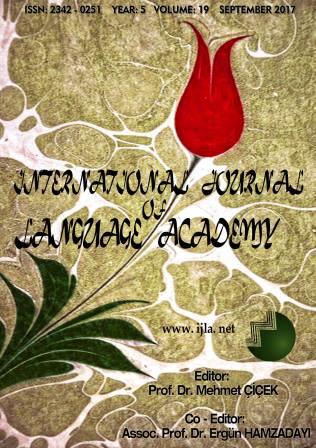Author :
Abstract
Bu araştırmanın amacı, okuma becerisinin altıncı sınıflarda etkinlikler, yöntem-teknikler ve araç-gereçlerle geliştirilmesi sürecini Türkçe Dersi Öğretim Programı doğrultusunda değerlendirmektir. Araştırma tarama modelinde betimsel bir çalışmadır. Araştırma evrenini Adana ili merkez ilçelerindeki (Seyhan ve Yüreğir) resmi ve özel ilköğretim okullarında görev yapan ve altıncı sınıflara giren Türkçe öğretmenleri oluşturmaktadır. Verilerin elde edildiği örneklem, olasılığa dayalı küme örnekleme yöntemi ile belirlenmiştir. Evrendeki her bir okul bir küme kabul edilerek yansız küme örnekleme yoluyla belirlenen 129 ilköğretim okulundan, amaçlı örnekleme yöntemi kullanılarak, altıncı sınıf derslerine giren 214 Türkçe öğretmeni seçilmiştir. Veriler araştırmacı tarafından geliştirilen “İlköğretim Altıncı Sınıf Türkçe Dersi Öğretim Programı Okuma Alanını Değerlendirme Anketi” kullanılarak toplanmıştır. Öğretmenlere uygulanan anket sonucunda elde edilen veriler betimsel istatistik tekniklerinden frekans ve yüzde kullanılarak analiz edilmiştir. Sonuç olarak öğretmenlerin çoğu, öğretmen kılavuz kitabında okuma alanına yönelik olarak önerilen etkinliklerin dışında nadiren başka etkinlik geliştirmekte ya da başka etkinlik geliştirmemektedir. Öğretmenlerin en çok kullandıkları yöntemlerin, sesli ve sessiz okuma, soru sorarak okuma, tahmin ederek okuma ve tartışarak okuma olduğu tespit edilmiştir. Aynı zamanda öğretmenlerin en çok kullandıkları araç-gereçlerin öğretmen kılavuz kitabı, ders kitabı ve öğrenci çalışma kitabı olduğu, yarısından çoğunun okuma alanına yönelik olarak yeterince araç ve gereç kullanmadıkları, bunun en önemli nedeninin okullarındaki araç-gereç eksikliği olduğu saptanmıştır.
Keywords
Abstract
The aim of this research is to evaluate the reading skills’ process of developing by way of activities, method-technical, instruments in sixth grades in the way of Turkish Language Teaching Curriculum. The research is a descriptive survey study. The population of the research is the teachers who teach in state and private elementary schools in central districts (Seyhan and Yüreğir) of Adana. The sampling for the data was determined via random stratified sampling. Each school in the population was regarded as a group and 214 teachers who teach Turkish to the 6th grade were selected with purposeful sampling out of 129 schools which are determined through random stratified sampling. The data of the study were collected through “The Questionnaire to Evaluate the Field of Reading in Turkish Language Teaching Curriculum for 6th Grade of Elementary School” which was developed by the researcher. The data of the questionnaire which was applied to teachers was analyzed with the techniques of descriptive statistics, namely frequencies and percentages. Consequently, most of teachers plan activities else except which are in the teachers’ guidance book about the field of reading rarely. It is determined that majority of methods used by teachers are oral and silent reading, reading by asking, reading by forecasting and reading by debating. Also the frequently used materials of teachers were, the teachers’ guidance book, the course book and the students’ activity book. More than half of the teachers did not use sufficient materials for the field of reading and it was stated that the main reason for this situation was the lack of materials in schools.





